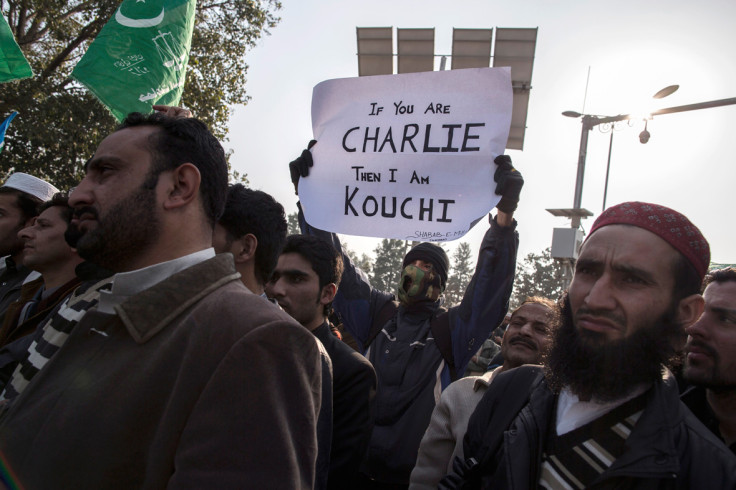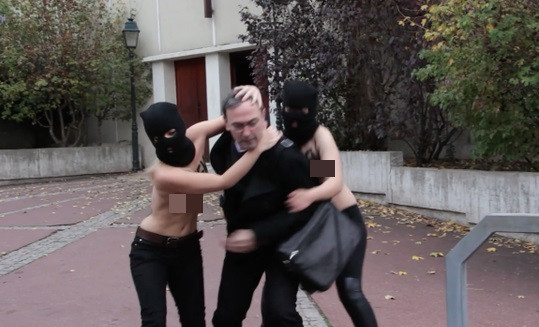Inna Shevchenko: Charlie Hebdo and the Godless witch

When people call me a 'Godless witch' they probably call think they have proved a point, got one over me. But in fact being a godless witch is fundamental to who I am. It is the source of my freedom.
To be able to criticise or simply mock religion and its bunch of horny sexists - I mean leaders - is still forbidden by law in many countries, and unofficially in many others. The murder of the caricaturists from Charlie Hebdo, the French satirical magazine, by religiously motivated terrorists, has thrown fresh light upon debates on blasphemy.
Is it part of our freedom of speech or is it an insult? Should it be forbidden or allowed, supported or condemned? Although the majority of people declared their support, a few angry clerics raged in opposition, and even the supposedly moderate Pope said that people who mock Islam or other religions should 'expect a punch'.
But, as we debate, another blasphemer is getting his punishment. Raif Badawi, a blogger from Saudi Arabia, has been condemned to 1000 lashes and 10 years in jail for writing articles on atheism and secular society.
Some time ago, another Saudi citizen - not a faithless rat but one of those who dedicated his life to God - received a very different sentence. Fayhan al-Ghamdi, a "celebrity" preacher, was arrested for torturing, raping and killing his 5-year-old daughter Lama. The local press wrote that he showed "enormous bravery" in accepting his guilt and the ensuring punishment.
Ghamdi was initially ordered to pay just £31,000 to Lama's mother, a sum which is apparently considered fair compensation under Islamic law. By God's will, the preacher was really lucky that Lama was not a boy, otherwise he would have had to pay twice that amount.
Later, under the pressure of campaigners, the killer was sentenced to eight years in jail and 600 lashes. He ended up being released after spending less than a year in jail.
Saudi Arabia is, of course, known for its strong religious morality, as Ghamdi's behaviour clearly demonstrates. Yet the war on infidels is being prosecuted on a much wider scale; in fact it is going on everywhere.

Courts and kalashnikovs
Whether by Isis Kalashnikovs or by judicial charges in USA and the more tolerant Europe, the infidels are being silenced, their dissent stamped out. My fellow Femen activists are systematically brought to trial for blasphemous protests, charged with exhibitionism, hooliganism and other heinous crimes you could not imagine.
Within Femen, we wonder why our topless demonstrations against sex slavery are not mitigated by the right to freedom of expression, the very same right which permits aggressive religious demonstrations all over the world. Do the religious texts say something about this?
But being a godless witch is, in fact, where my freedom begins. And, to be honest, it is where I draw my pleasure.
It is pleasant to enjoy fully, without compromises, the freedom of speech, to enjoy blasphemy. When it comes to ideas – and let's not forget that religious creeds are themselves ideas - we should be able to analyse, criticise, mock and do whatever our fantasies allow us to imagine, whether it is offensive to one or not.
It is very offensive to me, as a woman, a feminist and as an atheist, what is said by the Pope and Islam's Imams. But I don't start wielding a Kalashnikov; the most violent thing is do is pull my shirt up in front of these people, as a form of protest or just for fun, to see their red cheeks.
They say religious people have convictions. Well atheists have convictions too. Both should be able to express themselves without fear of being shot, whipped or imprisoned.
Blasphemy is not a crime or an insult, as religions define it. Blasphemy is a celebration of freedom of expression. Blasphemy is funny and smart, as Charlie Hebdo proved, and will prove again. Blasphemy is beautiful and free, like Aliaa Elmahdy, Golshifteh Faranahi, like Meriam Namazy and, of course, like FEMEN.
We need to stop looking at blasphemy through religious prism, seeing it as a possible offence to someone, but instead to look at it through a humanistic point of view. Blasphemy is a celebration of freedom of expression and a contribution to secularism. Blasphemy should not only be allowed but legally protected in secular society, in the same way we protect freedom of speech.
Even in modern times and even within "secular" states, the universal law of freedom of speech does not guarantee us the right to criticise religion. In reality, to criticise or to mock religion is neither allowed, nor safe. But, as long as blasphemy remains dangerous, there will be a need to commit it.
By speaking about or laughing at religions we can destroy the sensitivity that has already cost far too many lives. The global protection of religion by communities, governments and legislative systems must end, in the name of secularism. And I am not talking about affirmative secularism, nor inclusive secularism, simply secularism. And blasphemy has to be considered as a tool for this mission.
Moreover, there is nothing more effective in this fight than female blasphemy: there is nothing more dangerous for religious institutions than women against Gods, and there is nothing healthier for secularism than women criticizing religion, their biggest historical oppressor.
Female blasphemy is not only a brave act of freedom of speech but also a big threat to the patriarchal culture that is also enforced through religion. Acts of female blasphemy are a pure definition of the process of women's self-liberation, as women are the first victims of all religions.
'To criticise or to mock religion is neither allowed, nor safe. But, as long as blasphemy remains dangerous, there will be a need to commit it.'
Female blasphemy is the most successful vehicle for secularism and freedom of speech. It is a demonstration of our common progress. By expressing rebellious atheism and committing blasphemy, we can destroy the unquestionable myth of super power and holiness that was built around religious ideologies, therefore creating free debates and showing the path towards a global liberation of society.
In the end, it's quite simple. If religious institutions need laws, murder, torture and prisons to protect their faith from blasphemy, their faith must be weak. Maybe, deep inside they all wonder whether Mohammed was really that benevolent, whether the Virgin Mary was really a virgin, and whether God is not really there after all.
By talking and laughing about it more, by committing more blasphemy, we will create more space to enjoy our freedom in safe surroundings for all of us. Today, we need to blaspheme. We need to express our freedom and our progress.
© Copyright IBTimes 2025. All rights reserved.






















